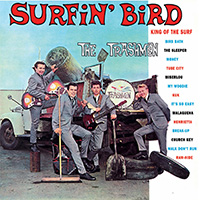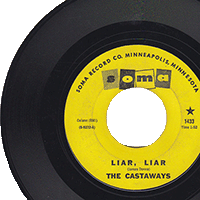Koogan’s Leaning Post
5420 Excelsior Blvd.
St. Louis Park
Much of the information below comes from an interview with Phil Eder, who had a hand in all of the businesses below from 1968 to 1987 when the property closed. I thank him for his frank insights on these many ventures!
Koogan’s Leaning Post was located in the Lilac Way Shopping Center, St. Louis Park.
LILAC WAY SHOPPING CENTER
The 30,000 square foot Lilac Way Shopping Center had a prime location at the Northeast corner of Highway 100 and Excelsior Blvd. It was the first in the State, built in 1941. Unlike Miracle Mile, which was built across Excelsior Blvd. ten years later and is often cited as the earliest of its kind, Lilac Way was not so much a strip mall but a series of buildings, and was much smaller that Miracle Mile’s 154,000 square feet. It was also not all built at one time but grew incrementally, and had some standalone buildings.
LAYOUT
The complex was built to go around the corner. In the photo below, the road in the lower left corner is Excelsior Blvd., which was known as Highway 212 at the time. The road at the very top is Highway 100. Parallel to Highway 100 is a service road (now Park Center Blvd.) that was called Wooddale Ave. The large white building facing Wooddale/Highway 100 was called the Lilac Lanes Recreation Building in the initial ad announcing the opening date. The rest of the complex was the Lilac Way Shopping Center. Although many of the stores faced the service road, they all had Excelsior Blvd. addresses. If you follow the long row of stores that face Excelsior Blvd., take the sharp right down the next row of stores (you can see the shadow of the huge Coke billboard on top), the Leaning Post was on the next corner.
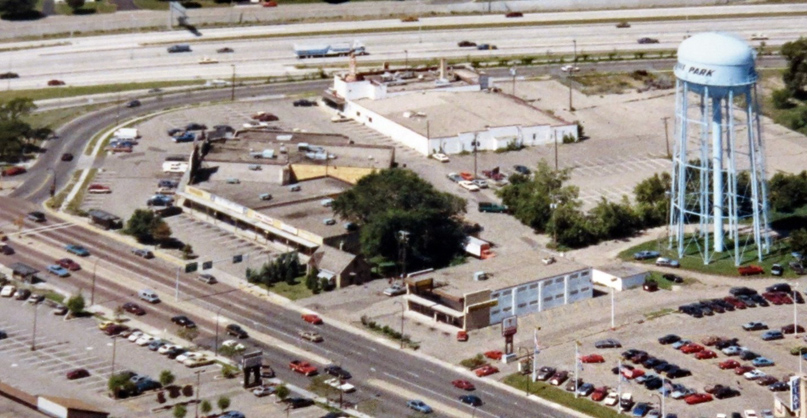
FRANK THEROS
The Shopping Center was the brainchild of Frank Theros and Nick Phillips. Theros was born in Olibia, Greece, in 1898, and served in the US Army in France in World War I from 1918 to 1919. According to permit approvals published in the Minneapolis papers, he operated the Ha Ha (as in Minnehaha) Cafe at 2629 East Lake Street in 1927 and 1928, and in 1931 he owned the Stadium Café.
NICK PHILLIPS
Nicholas Basil Filosofopoulos was born in Tripolis, Greece in 1891. It is unclear whether he served in World War I, as his record only shows a “Military Date” of December 21, 1918. On his military registration card in 1918 he wrote that he worked at a restaurant.
In the 1930s he lived at the Curtis Hotel in Downtown Minneapolis and worked at the cigar stand in the lobby there. On his World War II draft registration card he wrote that he worked at both Lilac Lanes Cafe and the Curtis Hotel. In about 1940 he moved to St. Louis Park.
Phillips died in June 1958, and the Lilac Way Shopping Center went to his wife Elly. Phil Eder was under the impression that Nick’s will forbade Elly from selling the property.
The Lilac Lanes Cafe/Kings Inn stayed in the Theros family. Frank’s son George took it over from Frank.
5420 EXCELSIOR BLVD.
The first phase of the Lilac Way Shopping Center that opened was the bowling alley, which opened on December 22, 1941.
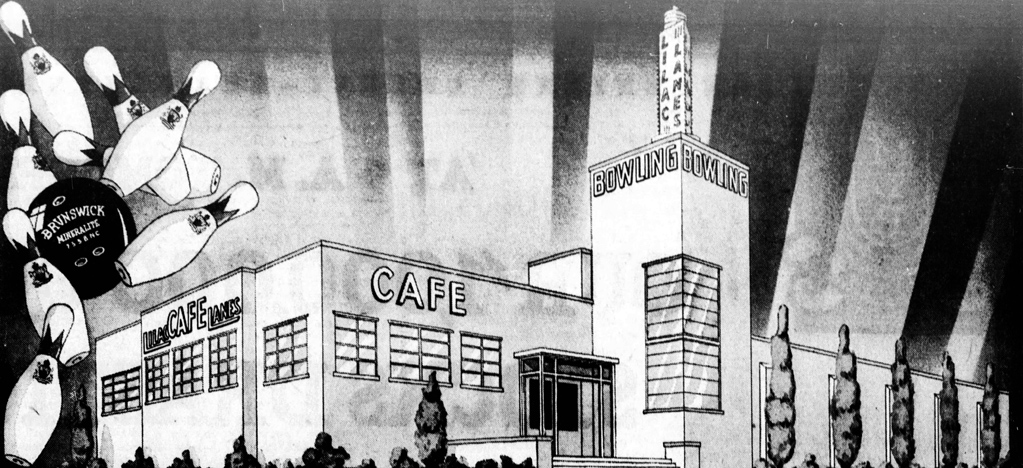
On December 27, 1941, the adjoining Lilac Way Cafe, and the first phase of the Shopping Center also opened.

The space where the Leaning Post would go is where you see “Belt Line Groceteria” in the drawing above. It was early days and they probably didn’t have the grocery store lined up yet, so that was probably just a placeholder.
The space hosted many businesses over its long life. Here are the ones leading up to the Leaning Post, the last tenant.
NATIONAL FOOD
The first tenant was the National Food store, from 1942 to July 1953. The names National Food and National Tea appeared to be interchangeable.
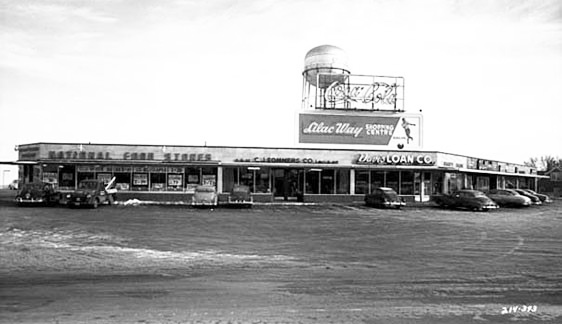
LILAC LANES SUPER VALU
On July 9, 1953, the store became a branch of the Hopkins-based SuperValu chain. The roots of this grocery retailer go back to the B.S. Bull, Newell & Harrison Co. Minneapolis wholesale grocery firms. In 1942, the Super Valu name was introduced. Entrepreneurs Winston and Newell formed a voluntary group of stores with an extensive program of services to retailers and stressed nationally advertised brand names. The company’s name was officially changed to Super Valu Stores, Inc.
The store advertised its exclusive “rolling cold” facilities, which meant that meat was refrigerated during all stages of preparation. Other features included air conditioning, magic carpet doors, relaxing music, Witt’s Bakery, Spee-Dee checkout counters, a Kiddie Korral with TV (introduced by Red Owl at Miracle Mile across the street in 1951), and Gold Bond Stamps. The store manager was Ivan Hagen, and Chet Janson was the meat manager. In December 1956, new owner-manager Burton J. “Bud” Amlaw purchased the store from the late Harry Botten.
RUBY’S FINE FOODS
Ruby’s Fine Foods opened in August 1959. It was owned by Morton (“Marty”) Silverman. The article in the Minneapolis Star revealed that the store had 6,000 square feet. Silverman’s family had been in the grocery business for three generations, and his father, Reuben R. Silverman, owned a store on Hennepin Ave. (October 13, 1959)
Ruby’s ran “Lost Our Lease” ads in the St. Louis Park Dispatch in April 1963, and ads to rent the space appeared in the Minneapolis papers in September 1964 to January 1965.
DANTE’S
1965. No idea what this was or where it came from.
BONANZA STEAK HOUSE
1966 to mid- 1968. One of a few around the Twin Cities
BONANZA SIRLOIN PIT
In about September 1968, the Bonanza Steak Houses just changed their names to Bonanza Sirloin Pit – the ads were just the same. It may have gone out of business when its application for a liquor license was denied in July 1969.
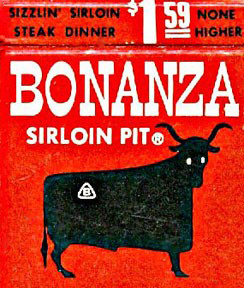
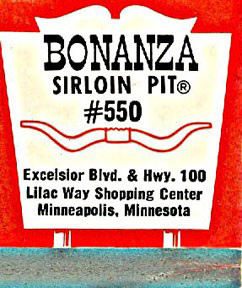
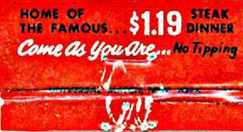
BURGUNDY BULL
The formation of Burgundy Bull Inc. was announced on December 2, 1968 in the Star. Its purpose was to franchise fast food places specializing in burgundy-marinated beef sandwiches. Incorporators were Tom Hastings, N. David Morton, John Noble Jr., and Paul La Victoire.
In the belief that single-food places are becoming obsolete, the units [franchises] also will serve Old English style fish and chips (french fries) and southern fried chicken. They also will have a gourmet carry-out counter.
Phillip L. Eder owned the franchise at Lilac Way. He explained in an interview that their chicken was marinated in dry vermouth, beef in burgundy wine, and ham in tawny port. Perhaps this was to get around the lack of a liquor license? No ads were found in the Minneapolis papers – only quotes on the stock market pages. On May 11, 1970, the Star reported that the company had filed for Chapter 11 bankruptcy.
HICKORY CORRAL
Hickory Corral was also a franchise owned by Phil Eder. Eder got out from under it because the owner was pilfering money. It also did not have a liquor license. Hickory Corral was selling off its chairs, etc. in January 1970
HICKORY WHEEL BBQ
The Hickory Wheel evolved from the Hickory Corral, again owned by Phil Eder and other investors. His investors were against having liquor, so Phil bought them out and applied for a liquor license, which he got. Evidence of the Wheel in the papers is seen from April 1 to June 17, 1971.
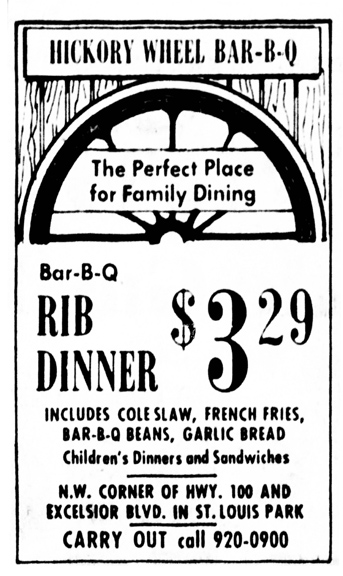
(KOOGAN’S) LEANING POST
(Koogan’s) Leaning Post was another enterprise of Phil Eder, Northern Franchises. “Koogan” was Don Koogan, who was married to Bev Aretz, one of the owners. (The Aretz family owned Bunny’s.) He had been a manager and partner at Bunny’s, and moved over to the Leaning Post.
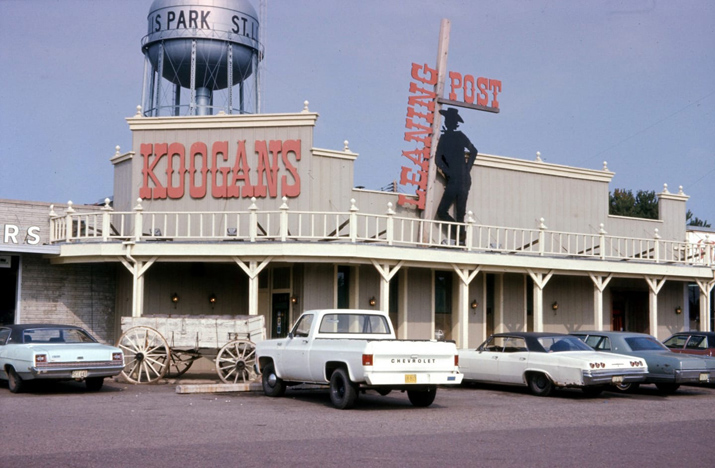
Koogan’s Leaning Post opened in February 1972, well placed for the mass of new drinkers when 18-year-olds were allowed into the bars on June 1, 1973. Phil had the impression that the St. Louis Park City Council was becoming “anti-bar” at the time, however, and was not proud of the Excelsior Blvd. strip that had developed.

The club featured a 22 ft. oval bar. In October 1972 the kitchen was opened.
In 1974 or ’75 Phil bought out Koogan, and took the name “Koogan’s” name off the sign.
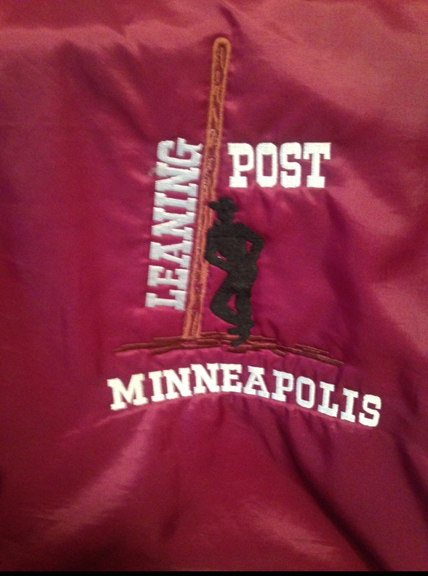
MUSIC AT THE LEANING POST
In an interview, Eder said that there was live music seven days a week, with the XL-5 as the house band for about five years. On Sundays they would have something “easier,” like the Frank Wagamon Quartet. Other frequent bands were Gangbusters and Headliners.
There are many fond memories of this place, which was sometimes viewed as a “meet/meat market.”
Alex Wilson was a memorable bartender.
Eder said that the place was busy, with as many as 6,000 customers coming through per week. The place got so popular that he expanded by taking over the neighboring barber shop and dry cleaner to use as offices and a coat room.
There were some problems, which was natural when you mixed alcohol with teenagers. On Fridays he would have six security people on hand to extinguish the fights. But he told his staff to be nice to the drunks, since they pay your wages! In the early-to-mid ’80s the papers were liberally sprinkled with reports of thefts and drug busts at the club.
LAST CALL
In the mid 1970s there was increasing talk about designating an Excelsior Blvd. redevelopment district, which threatened the continuing existence of Lilac Way. In August 1976, for the first time there was organized a Lilac Way Merchants’ Association, headed up by Leaning Post owner Phil Eder and relative newcomer Norm Kirchner of the Lilac Way Shoe Store. The Association spent $1,000 of its own money to extend the old west motif of the Leaning Post throughout the complex. (The King’s Inn did not participate.) Efforts to remove the huge Coca-Cola sign from the roof were stymied by the amount of money that Coke was paying Mrs. Phillips, who owned the property.
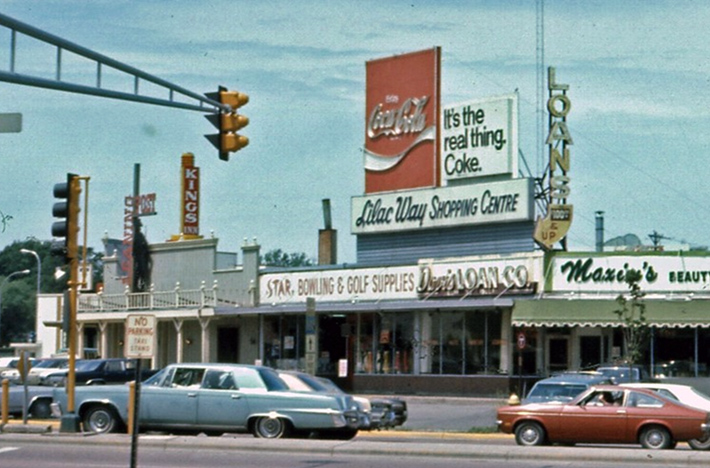
Despite these efforts, the old shopping center was ripe for redevelopment. Construction of the 36th St. overpass wreaked havoc on traffic in the area, and the businesses never recovered.
Eder signed a Redevelopment Contract in 1984, but vowed to stay in business as long as possible. Eventually he took over the barber shop and dry cleaner next door for use as offices and a coat room.
The last day for the Leaning Post was November 17, 1987. On the last three days that the bar was open, drinks were back to 1972 pricing.
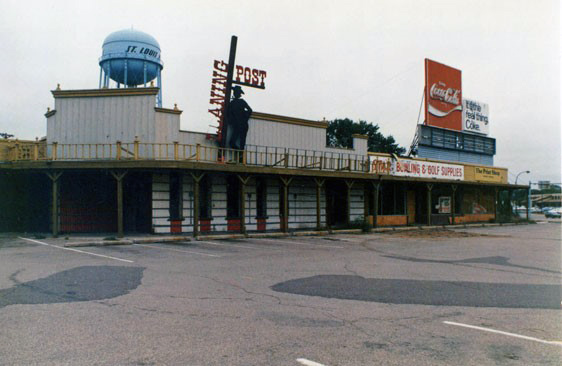
The complex was demolished in September 1988. (Demolition was delayed in the fall of 1987 when soil borings revealed high levels of trichloroethylene.)
The site sat vacant for many years as plans for its redevelopment came and went. The replacement buildings were not erected until 1992 – 1994.
Eder tried to find another location within St. Louis Park, even trying to buy Bunny’s, but with no luck. He ended up buying the:
- Iron Horse in Crystal in July 1977
- Stonewings in Bloomington in 1982
- Stonewings on the Lake (became Maynard’s) in 1985
- Bullrushes in Burnsville in 1985
